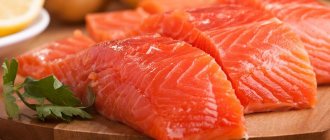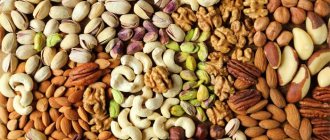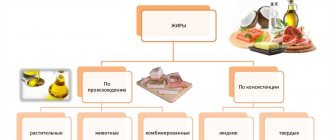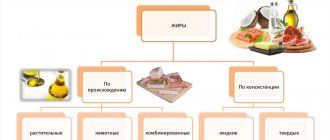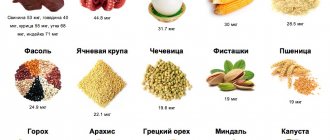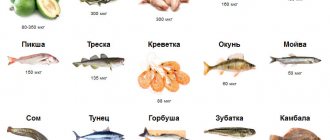For the normal functioning of the body, a person needs certain elements from food. In particular, it is necessary that the diet contains foods rich in vitamins, macroelements and microelements. One of the most important elements for human health is iodine . Without iodine, the normal functioning of the pancreas, the most important organ responsible for digestion and regulation of blood sugar levels, is impossible. In addition, iodine is important for the thyroid gland, which is responsible for the functioning of the central nervous system, the process of digesting fats and carbohydrates, as well as for the condition of the skin and hair.
How much iodine does a person need per day?
Hormones produced by the thyroid gland are directly involved in the development of cells of the central nervous system, as well as skin and hair, so pregnant and lactating women should receive the maximum dose of iodine. For them, the daily dose is about 210 mcg per day. For an adult, 150 mcg of iodine is enough .
Children under two years of age need to be provided with at least 50 mcg of iodine. From two to six years, this dose should double. Well, schoolchildren need approximately 120 mcg of iodine per day.
Does everyone really need iodine supplements?
“Yes, this statement has every basis. Iodine is an essential component of thyroid hormones, which, in turn, ensure the full development and functioning of the basic functions of the human body,” says Elena Gubkina.
The main source of iodine for humans, notes the endocrinologist, is food, drinking water and air. The microelement consumption rate is 150 micrograms per day, for pregnant women - 250 micrograms.

Butterfly on the neck. Six myths about the thyroid gland Read more
What foods contain iodine?
The most iodine is found in seafood . It is known that the inhabitants of the sea elements are able to accumulate iodine from salt water. In particular, just 150 grams of seaweed, or kelp, can provide the daily dose of iodine that an adult needs. Fucus contains a fairly large amount of iodine, but in our country it is quite difficult to find this algae in stores.

Cod liver is quite rich in iodine. Just 100 grams of this product contains about 350 mcg of iodine. Raw sea fish, such as flounder, halibut or herring, contain 100 to 200 mcg of this valuable micronutrient. Approximately the same amount of iodine is contained in 100 grams of squid, mussels, oysters and shrimp.
It should be remembered that iodine is a rather unstable compound that can volatilize during heat treatment. Therefore, it is advisable to consume seafood not fried: it is recommended to stew or boil them.
You cannot exclude cheeses and shelf products from your diet, which contain about 11 mcg of iodine per 100 grams of weight. Approximately 7 mcg of iodine is found in potatoes, carrots, tomatoes and sorrel.
Persimmons, strawberries, lemons and grapes contain no more than 5 mcg of iodine per 100 grams of weight. Therefore, nutritionists recommend purchasing fruits and vegetables that are grown in soils enriched with iodine.
We must not forget about such a valuable food product as chicken eggs. One egg contains not only proteins and fats that are valuable for the body, but also approximately 12 mcg of iodine.
Many people try to compensate for iodine deficiency in their diet by consuming special iodized salt. Just two grams of this salt can completely replenish the daily volume of this valuable microelement. Iodized salt was invented in America, where at the beginning of the last century there was a significant increase in the number of children born with cretinism (a severe form of mental retardation). Children with mental retardation were born in places where the soil, and therefore food, was not rich enough in iodine.
It is important to remember that iodized salt will only be effective if you add salt to your food after cooking. Otherwise, the iodine will evaporate during heat treatment.
Iodine in the human body
The human body contains from 20 to 50 mg of iodine, of which at least 60% is concentrated in the thyroid gland, 40% in the muscles, ovaries, and blood.
Thyroid : Iodine is a component of the thyroid hormones (thyroid hormones and thyroid-stimulating hormone) and is necessary for their synthesis. They determine the level of metabolism, influence the conversion of food into energy and the ways of its use. Thyroid hormones are important for the growth and development of all organs.
Iodine takes part in the regulation of:
- energy metabolism, body temperature;
- speed of biochemical reactions;
- metabolism of proteins, fats, water-electrolyte metabolism;
- metabolism of a number of vitamins;
- processes of growth and development of the body, including neuropsychic development.
In addition, iodine increases tissue oxygen consumption.
Benefits of iodine: provides more energy, promotes growth, facilitates dieting by burning excess fat, activates mental work, guarantees healthy teeth, skin, nails, and hair.
Iodine in food:
- seafood - red and brown algae (kelp), halibut, cod, herring, shrimp, haddock, sea salt, shellfish, sardines;
- iodized salt;
- beef liver, eggs, milk;
- onions, sorrel, white cabbage, carrots (if grown in soil rich in iodine).
Some iodine comes from water.
iodine intake for an adult is 150 mcg, the maximum allowable amount of intake is 300 mcg. During pregnancy and lactation, the norm increases to 175 - 200 mcg.
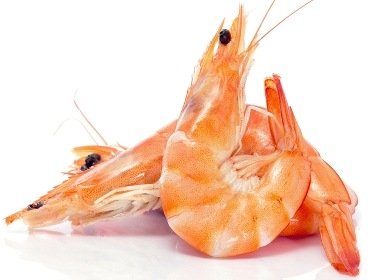
Iodine in the human body: role, iodine norm, deficiency and excess, food

Iodine in the human body: role, iodine norm, deficiency and excess, food
Lack of iodine in the body
Iodine deficiency occurs if the amount of microelement intake per day is less than 10 mcg.
The vast majority of iodine is found in the ocean. Large amounts of mineral matter are washed away from the soil surface by snow, freezing, rain, wind, floods and rivers. All grain crops grown on such soils have an iodine deficiency - 10 mcg/kg instead of 1 mg/kg.
WHO researchers estimate that 1 billion people in developing countries are at high risk of developing diseases caused by iodine deficiency.
Causes of iodine deficiency in the body:
- Unsatisfactory amount of microelement intake from food.
- Low human consumption of seafood.
- Lack of iodine prophylaxis in iodine-deficient regions.
- The presence in the diet of factors that interfere with the absorption and utilization of iodine (intake of excess amounts of bromine, iron, manganese, lead, calcium, chlorine, cobalt).
- Taking medications that interfere with the absorption and utilization of iodine (lithium carbonate).
- Iodine metabolism disorders.
- Increased background radiation.
- Habitat pollution.
- Increasing the body's sensitivity to allergens.
Symptoms of iodine deficiency in the body:
1.Increasing the production of thyroid hormones.
2. Formation of goiter.
3. The occurrence of iodine deficiency pathologies:
- hypothyroidism (extreme manifestations in children - cretinism, in adults - myxedema);
- loss of strength, decreased performance, drowsiness, development of edema of the limbs, torso, face;
- elevated cholesterol levels;
- weight gain;
- bradycardia (a type of arrhythmia with a low heart rate);
- constipation;
- decreased intellectual level: slowed mental reaction, impaired cognitive functions, attention.
- cretinism: the embryo develops physical, neurological, mental defects of cretinism due to iodine deficiency in the first 6 months of the mother's pregnancy, which can be prevented with the help of timely iodization of the mother.
- deaf-mute;
- various types of paralysis;
- decreased fertility (the ability of a sexually mature organism to reproduce), stillbirth, congenital malformations;
- increased mortality during the perinatal period.
Author: Tamara Aleksandrovna Stelmakh, Candidate of Medical Sciences
Lack of iodine and excess weight
Hormones produced by the thyroid gland take part in a number of metabolic processes, in particular, in the breakdown and accumulation of fats and carbohydrates. If there is a lack of iodine in the diet, the thyroid gland changes its operating mode. In the process of evolution, a special mechanism has been developed: if the body is in danger in the form of a lack of food, the endocrine system begins to “work” to create reserves. As a result, fat deposits are formed, which often becomes the cause of obesity. At the same time, the production of growth hormones decreases: all metabolic processes in the body slow down in order to “wait out” the difficult period. This also affects the functioning of the nervous system: a person becomes inhibited, his memory deteriorates and his ability to concentrate decreases.
Benefits of iodine
The benefits of iodine for humans can hardly be overestimated. The microelement is the basis for normal life and, in particular, the functioning of the endocrine and nervous systems. Its main functions can be called:
- Participation in the production of hormones;
- Improving the quality of the exchange system;
- Regulation of body temperature;
- Maintaining normal weight and rapid breakdown of fat tissue.
Iodine is necessary for the production of the required number of phagocytes, which actively fight pathogenic flora. Plus, the muscular system and skeleton need microelements.

Why is iodine deficiency dangerous?
If the body does not receive the required amount of iodine for a long time, the following symptoms are observed:
- the thyroid gland increases in size (goiter develops);
- the functioning of the endocrine system suffers;
- children experience delays in both physical and intellectual development;
- drowsiness, constant feeling of fatigue, lack of energy;
- deaf-mute;
- disorders of the reproductive system: impotence, infertility, fetal development abnormalities, etc.
A lack of iodine in the diet may also cause problems with the cardiovascular and respiratory systems.
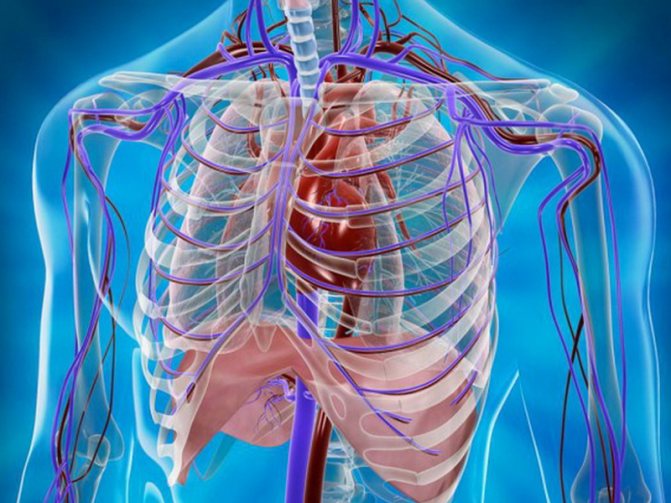
Harm of iodine
It’s good when it enters the body in abundance, but bad when there’s too much of it. Its excess causes a certain kind of poisoning, due to which a person’s well-being worsens significantly. Signs of this condition are loss of strength and chronic fatigue, anxiety and a tendency to depression, tachycardia. A person may experience numbness of the skin, the appearance of rashes for unknown reasons, and even severe skin lesions.
Excess iodine appears due to the use of certain medications and products in which this element is present. The disorder can also occur as a result of metabolic failures.
Do I need to take iodine-containing medications?
Only a doctor can decide whether a person needs to take iodine. Typically, taking medications containing iodine is recommended:
- during pregnancy planning;
- during pregnancy and breastfeeding;
- newborns whose mothers suffer from iodine deficiency;
- during heavy mental stress (during exams or when working on important projects).
Iodine is one of the most important elements necessary for the normal functioning of the body. However, we must not forget that excess iodine is no less dangerous than its deficiency. It is important for every person to eat right: only a balanced diet will provide the body with everything necessary for its normal functioning. Only a doctor can decide whether a person needs additional medications containing iodine.
Daily requirement
We have already said that iodine enters our body with food. Residents of coastal regions are lucky, since both the water and the soil in these areas are saturated with our beneficial element. Plus, they can often eat seafood and fish, which contain iodine in large quantities.
How much iodine do we need per day so that we do not experience a deficiency of this element? No need to do complicated calculations. To get your daily dose, replace regular table salt with iodized salt. Just 5-7 g – and your body will be happy. This is one teaspoon, which is quite enough.
